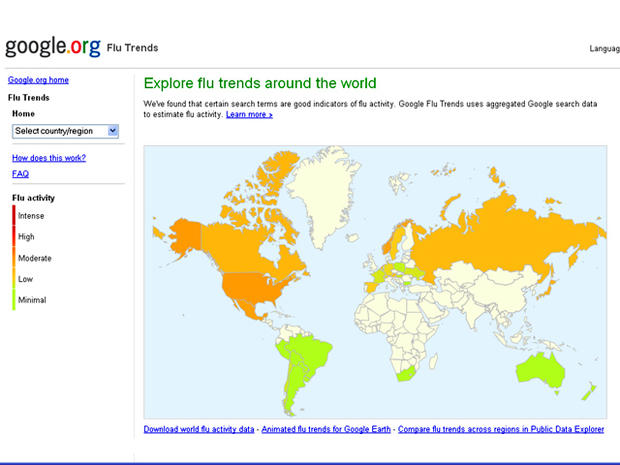Google helps doctors track flu season: How?
(CBS) When doctors need more information, turns out they turn to the same source as most people: Google.
According to a new flu study, the search engine's "Flu Trends" tracker has proved effective at monitoring influenza cases.
For the study, published in the Jan. 9 issue of Clinical Infectious Diseases, researchers at Johns Hopkins Medicine tracked data from Google Flu Trends for a 21-month period between January 2009 and October 2010.
Google Flu Trends monitors where flu-related search terms are coming from and provides a color-coded map that shows search activity in those regions. The researchers - who worked independently of Google - found a strong correlation between the rise of flu-related internet searches in Baltimore City and a subsequent rise in the number of patients who came to local hospitals with flu symptoms.
What is impressive about Google Flu Trends, the researchers said, is that it provides a real-time predictor of when more patients might be coming to the hospital with the flu - "something our current influenza surveillance cannot do," study author Dr. Andrea Dugas, an emergency medicine research fellow at Johns Hopkins University, told HealthPop. She said that's why a tool like Google Flu Trends is especially helpful to doctors on the front lines, like in emergency departments.
Currently, most emergency departments rely on flu data from the Centers of Disease Control and Prevention. Those reports include surveillance data, lab test results, case reports on symptoms, and other information that could help clinicians. The problem with that method of reporting is that by the time the doctors get the reports, the information is already a couple weeks old.
Dugas said the tracker's methods "are not one hundred percent accurate and don't replace current laboratory and other surveillance methods; however, they are a powerful adjunct to our current surveillance systems." In the long-term, Dugas and her fellow researchers said in a written statement that they hope to develop a similar flu surveillance model that emergency departments could use to predict a spike in flu cases.
What does Google think of researchers using their tool to fight the flu?
"We're excited to see researchers using this data independent of us, as the authors of the CID publication have done, and are encouraged by their findings," Google spokesperson Kate Hurowitz told HealthPop. "We hope Google Flu Trends will be a useful complementary flu surveillance tool."
